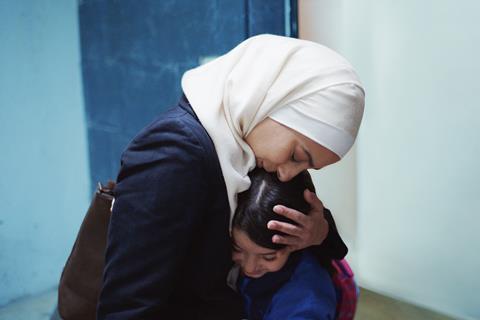A widow fights against powerful patriarchal laws in the first Jordanian film to play at Cannes

Dir: Amjad Al Rasheed. Jordan/France/Saudi Arabia/Qatar. 2023. 113mins
According to Jordan’s laws, which are guided by Islamic Sharia jurisprudence, if a woman does not have a son, the husband’s family is entitled to a share of the inheritance. Thus recently-widowed Nawal (Mouna Hawa) has no time to mourn: instead, she is embroiled in a legal battle with her brother-in-law, Rifqi (Haitham Omari), desperate to keep the only home she and her daughter know. Nawal lies about being pregnant, delaying court proceedings for nine months on the potential promise of a male heir. Inspired by the real-life experiences of a close relative of director Amjad Al Rasheed, Inshallah A Boy delivers a social realist critique of Jordan’s structural oppression of women and girls.
Deftly makes use of scope and framing to maintain the intimacy of the story
Supported by the Jordan Film Fund, Inshallah A Boy is the first Jordanian film to have an official screening at Cannes (in Critic’s Week) and is Al Rasheed’s debut feature (he was a Screen Star of Tomorrow in 2016). With Holy Spider producer Rula Nasser on board, it can look forward to further festival exposure, — particularly in the Middle East— and arthouse distribution, thanks to its refreshing take on complex family dynamics.
Nawal moves between two metaphorical prisons: work and her home in Amman. The death of her husband throws her life into freefall, and she discovers a series of secrets about him – unemployed for the past four months, he owed his brother Rifqi money on their pickup truck and was having an affair. The apartment where she and daughter Nora (Selena Rababah) live is modest, with dated interiors, lit by the yellow glow of floor lamps. She pays an elderly woman in a neighbouring apartment to look after Nora until she returns from work each day.
Nawal takes public transport from their low-income community to the wealthier West Amman, where she works as a carer for an invalid lady from an affluent family. At work, she is diligent and keeps her head down. At home, she must deal with her late husband’s debts, including Rifqi’s insistence that she pay what he owed immediately – Rifqi has his own family to support.
Even though she doesn’t know how to drive, Nawal refuses to sell the pick-up truck to pay him. If forced to sell the apartment, she might also lose custody of Nora to Rifqi. Dragged through court proceedings and preferring to sell her own furniture than allow him the satisfaction or control over her life, Nawal looks for help in unlikely places.
Her employer Souad (Salwa Nakkara) and her daughter Lauren (a fierce turn from actress Yumna Marwan) want for nothing and make their status known. Lauren is educated but unhappy, complaining relentlessly about her cheating husband. The two women initially do not see eye-to-eye – and are shown almost exclusively in shot-reverse-shot until half-way through the film, when Lauren confides in Nawal and the two form an unlikely bond. Lauren is pregnant and wants an abortion. Disapproving but sympathetic, Nawal agrees to help Lauren in exchange for the positive pregnancy test she needs to delay court proceedings. At this crucial moment, they sit together, conspiring their transgressions as an act of intimacy, their tones hushed, their faces turned away from the camera.
The exterior shots of Amman reveal a busy city with standstill traffic, noisy playgrounds and street life even at dusk, and cinematographer Kanamé Onoyama (About Leila) deftly makes use of scope and framing to maintain the intimacy of the story at the heart of the film. Interiors show Nawal in close-up or mid-range, focusing on the deeply personal nature of her predicament. A subtle and sparing use of music – to bring the audience in and out of the naturalism Al Rasheed achieves with mostly direct sound – bookends the film.
Ultimately, there are no villains here: everyone suffers in this system of inequality where even someone who wants to take control of their own life can’t. At times, Nawal behaves irrationally, but, motivated by her stirring fight for independence, Mouna Hawa’s (In Between) sincere and gutsy performance will win audience favour. Pregnant or not, Nawal fights for future generations to inherit equality.
Production company: The Imaginarium Films
International sales: Pyramide International, amauruc@pyramidefilms.com
Producer: Rula Nasser, Aseel Abu Ayyash
Script: Amjad Al Rasheed, Rula Nasser, Delphine Agut, from a story by Amjad Al Rasheed
Production design: Nasser Zoubi
Cinematography: Kanamé Onoyama
Editing: Ahmed Hafez
Music: Jerry Lane, Andrew Lancaster
Main cast: Mouna Hawa, Haitham Omari, Yumna Marwan, Salwa Nakkara, Mohammad Al Jizawi, Eslam Al-Awadi, Seleena Rababah, Serene Huleileh
























